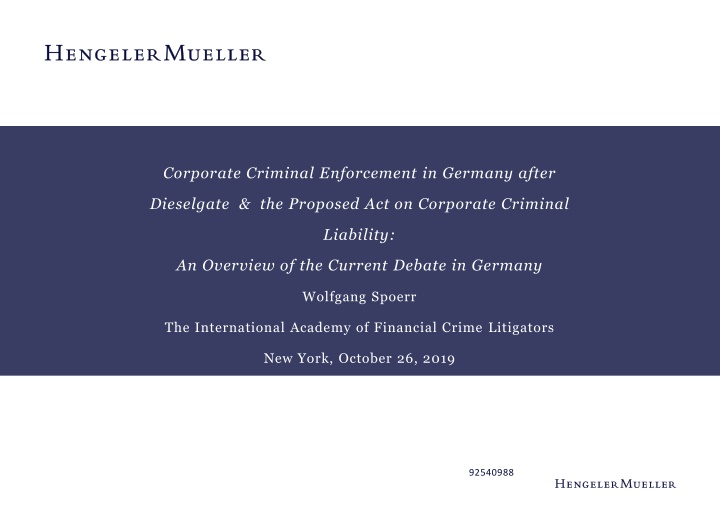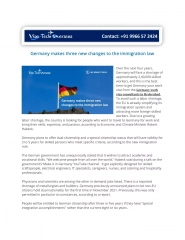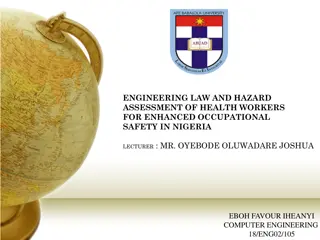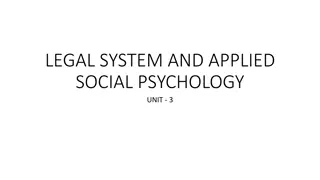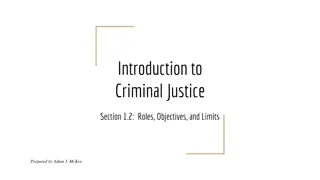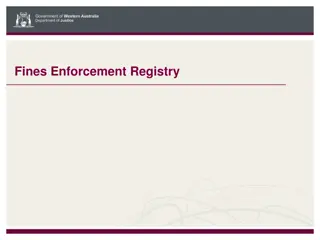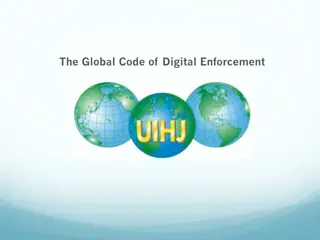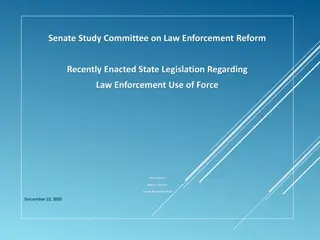Corporate Criminal Enforcement in Germany: Overview and Developments
This overview provides insights into the evolution of corporate criminal responsibility in Germany, discussing key topics such as the existing legal framework, proposed new laws, attribution of crimes to corporations, and recent developments in corporate criminal liability. It also outlines the timeline of legislative processes and recent governmental agreements related to corporate criminal enforcement in Germany.
Download Presentation

Please find below an Image/Link to download the presentation.
The content on the website is provided AS IS for your information and personal use only. It may not be sold, licensed, or shared on other websites without obtaining consent from the author.If you encounter any issues during the download, it is possible that the publisher has removed the file from their server.
You are allowed to download the files provided on this website for personal or commercial use, subject to the condition that they are used lawfully. All files are the property of their respective owners.
The content on the website is provided AS IS for your information and personal use only. It may not be sold, licensed, or shared on other websites without obtaining consent from the author.
E N D
Presentation Transcript
Corporate Criminal Enforcement in Germany after Dieselgate & the Proposed Act on Corporate Criminal Liability: An Overview of the Current Debate in Germany Wolfgang Spoerr The International Academy of Financial Crime Litigators New York, October 26, 2019 92540988
Outline and Key Topics for Discussion Corporate Criminal Responsibility in Germany - Evolution Supranational Framework Current Framework in Germany: Corporate criminal liability already exists New law: Drastic sanction framework, unfettered sentencing discretion What may constitute a corporate crime? Purpose of corporate criminal liability Attribution of crimes to the corporation Allocation of resolution responsibilities between prosecutors and the courts Resolution options without indictment Territorial scope of application and jurisdiction 2
Timeline: development of corporate criminal liability in Germany and legislative process Discussion regarding corporate criminal liability at a Conference of the Association of German Jurists (Deutscher Juristentag), Hamburg Federal Constitutional Court determines in its Lisbon- decision the fault principle (Schuldprinzip) as a fundamental principle Draft bill by ministry of Justice of North Rhine- Westphalia rejected Cologne draft of a corporate criminal law 1949 1968 1994 2002 2007 06/2013 09/ 1953 06/2009 11/2013 12/2017 Introduction of a unified corporate fine and general supervisory duty of owners (since 1974 implemented in 30 OWiG) Maximum fine was increased to EUR 10 million (intent) and EUR 5 million (negligence) + profit Maximum fine was doubled to EUR 1 million (intent) and EUR 500,000 (negligence) + profit Possibility to increase the maximum corporate fine for administrative offenses to ten times the statutory maximum for the offense. Violations of operational supervisory duty can be sanctioned in the FRG but only for enumerated crimes in several laws Inclusion of general offences Reduction of the causality requirement and extension of the circle of offenders 3
Recent and current developments - timeline new federal government agrees to revise legal framework for corporate criminal liability internal draft of federal ministry of justice governmental agreement on draft resolution of parliament intra-governmental pre-coordination of the 1stministerial draft parliamentary proceeding in force 2 years after promulgation 09/2019 05/2019 06/2018 10/2018 02/2019 2/2018 8/2019 2020 Currently Braunschweig prosecuors impose EUR 1 billion fine on VW Stuttgart prosecutors impose EUR 870 million fine on DAIMLER Munich prosecutors impose a EUR 8,5 million fine on BMW Stuttgart prosecutors impose EUR 535 million fine on PORSCHE and EUR 90 million fine on BOSCH Munich prosecutors impose EUR 800 million fine on AUDI 4
Supranational Framework Art. 10 United Nations Convention against Transnational Organized Crime Art. 26 United Nations Convention against Corruption principles of global compact Different legal acts by EU and Council of Europe which cover corporate liability (e.g. Art. 6 Directive 2008/99/EC of 19 November 2008 on the protection of the environment through criminal law) Art. 2 Convention on Combating Bribery of Foreign Public Officials in International Business Transaction Record of the Application of the Convention on Combating Bribery of Foreign Public Officials in International Business Transaction and the 2009 revised recommendation on combating bribery in Internation Business Transactions Monitoring and evaluation of implentation of the convention (latest report of 2018) United Nations OECD European Union 5
Topics for Discussion Is there a consensus that some form of corporate criminal liability is needed or should criminal law focus on misconduct by individuals? Does corporate liability for criminal misconduct need to be criminal in nature or can it also be administrative/preventive and/or civil law/tort based? 6
Current Framework in Germany: Corporate criminal liability already exists 30 OWiG Senior Management 130, 30 OWiG Other Employee commits a crime commits a crime which violates duties incumbent on the corporation (e.g. obligatory supervision) or where the corporation has been enriched or was intended to be enriched senior management violates supervisory duties 17 IV OWiG fine up to 10 million EUR + profit per offense 7
Future Framework: Drastic Sanctions high fines without any statutory differentiation Dissolution of corporation Fine Naming and shaming EUR (intent) million (negligence) 1,000 EUR 10 million 500 Central sanctions under new law and fines pursuant to 30 OWiG above EUR 300 ( 55 II Nr. 2 VerSanG) register will include aggravated committed by senior management crimes persistently and 5 circumstances indicate risk of further significant corporate committed corporations worldwide turnover > EUR 100 million: with annual crimes being group-wide long years) redemption periods (5-15 10% of annual world wide, group wide turnover (intent) register provided to sanctioned entities, various authorities (e.g. courts, public prosecutors, authorities), (anonymized where foreign, supranational intergovernmental bodies information can be 5% (negligence) tax researchers possible), and 8
Topics for Discussion Should the statutory amount of a corporate fine be generic or should it distinguish according to the crime committed? Which other factors may be used to provide for statutory differentiation of fine levels? How will a very broad statutory fine level affect corporate defense? 9
The public policy of corporate criminal liability in the Draft Retribution/Retaliation severe sanctions Deterrence Rehabilitation reduction of the fine level in return for formalized internal investigation monitorship option admonishment option duty to investigate ( principle of legality ) high fine level 10
Topics for Discussion What is the key public policy goal of corporate criminal liability (retribution/retaliation, deterrence or rehabilitation) and which tools should be available? 11
What may constitute a corporate crime? 2 VerSanG corporate crime: a crime by which duties of the corporation have been violated or by which the corporation was enriched or intended to be enriched any crime which or is intended to enrich the corporation violates duties of the corporation or enriches the corporation violates the duties of the corporation intended to exclude crimes which only harm the corporation 12
Attribution of crimes to the corporation Corporate Crime Senior Management Junior Employee failure (intent or negligence not required!) by senior management re: organisation, selection, instruction or supervision Corporate Sanction 13
Topics for Discussion How do we exclude crimes by corporate employees for which a punishment of the corporation is inadequate? Under which conditions should crimes of employees and senior management be attributable to the corporation? 14
Allocation of resolution responsibilities: Formal resolution options from prosecutors to court Current Framework ( 30 OWiG) Draft Bill Public prosecutor no sanction without court/no sanction by public prosecutor principle of legality : in case of reasonable suspicion, prosecutor s office must initiate investigation Public prosecutor competent for standalone fine if underlying crime was committed by junior employees, appeal to local court Court competent if underlying crime was committed by senior management Court Only court can impose sanction Depending on offense and expected sanction: local court (bench of one professional and two lay judges) or regional court (three professional and two lay judges) 15
Resolution without indictment non prosecution decision without sanctions non prosecution decision with sanctions In general, a suspension is possible: If required, the resolution can be combined with conditions and instructions (e.g. a payment) de minimis-crime Consent of corporation and court required hardship insolvency prosecution abroad during an internal investigation cartel prosecution 16
Topics for discussion Should there be resolution options for the prosecutor without court involvement? 17
Corporate sanctions against foreign legal entities Crime committed in Germany Crime committed (also) abroad If crime is (also) committed in Germany, eg. effects in Germany of actions abroad If German criminal code is otherwise applicable (e.g. the offender is a German or for specific crimes, e.g. human trafficking) Sanction is possible if the legal form of the entitiy is equivalent to a German legal entity falling under the Act If legal entitity has a registered or administrative office in Germany in cases of hypothetical double criminality. 18
Jurisdiction for crimes committed abroad by employees of German companies Responsibility for crimes committed abroad: hypothetical double criminality test The corporation has a place of establishment in Germany 19
International Background - UN Art. 10 United Nations Convention against Transnational Organized Crime Liability of legal persons 1. Each State Party shall adopt such measures as may be necessary, consistent with its legal principles, to establish the liability of legal persons for participation organized criminal group and for the offences established in accordance with articles 5, 6, 8 and 23 of this Convention. 2. Subject to the legal principles of the State Party, the liability of legal persons may be criminal, civil or administrative. 3. Such liability shall be without prejudice to the criminal liability of the natural persons who have committed the offences. 4. Each State Party shall, in particular, ensure that legal persons held liable in accordance with this article are subject to effective, proportionate and dissuasive criminal or non- criminal sanctions, including monetary sanctions. in serious crimes involving an 21
International Background - UN Art. 26 United Nations Convention against Corruption Liability of legal persons 1. Each State Party shall adopt such measures as may be necessary, consistent with its legal principles, to establish the liability of legal persons for participation in the offences established in accordance with this Convention. 2. Subject to the legal principles of the State Party, the liability of legal persons may be criminal, civil or administrative. 3. Such liability shall be without prejudice to the criminal liability of the natural persons who have committed the offences. 4. Each State Party shall, in particular, ensure that legal persons held liable in accordance with this article are subject to effective, proportionate and dissuasive criminal or non- criminal sanctions, including monetary sanctions. 22
International Background - EU Article 2 - CONVENTION ON COMBATING BRIBERY OF FOREIGN PUBLIC OFFICIALS IN INTERNATIONAL BUSINESS TRANSACTIONS Responsibility of Legal Persons Each Party shall take such measures as may be necessary, in accordance with its legal principles, to establish the liability of legal persons for the bribery of a foreign public official. 23
International Background - OECD In these circumstances and considering that prosecutorial discretion has been identified as a horizontal issue by the Working Group, the lead examiners recommend that Germany ( ) take measures to ensure the effectiveness of the liability of legal persons. The lead examiners further recommend that Germany take steps to ensure the consistent implementation of this recommendation in all L nder, including through raising awareness among the prosecuting authorities at the L nder level to ensure that the large range of possibilities, available in the law, to trigger the liability of legal persons for foreign bribery offences is understood and applied consistently in all L nder. Report of the Application of the Convention on Combating Bribery of Foreign Public Officials in International Business Transaction, p. 28 (March 2011) 24
International Background - EU Article 22 Council of Europe Convention on Action against Trafficking in Human Beings Corporate liability 1.Each Party shall adopt such legislative and other measures as may be necessary to ensure that a legal person can be held liable for a criminal offence established in accordance with this Convention, committed for its benefit by any natural person, acting either individually or as part of an organ of the legal person, who has a leading position within the legal person, based on: a) a power of representation of the legal person; b) an authority to take decisions on behalf of the legal person; c) an authority to exercise control within the legal person. 2. Apart from the cases already provided for in paragraph 1, each Party shall take the measures necessary to ensure that a legal person can be held liable where the lack of supervision or control by a natural person referred to in paragraph 1 has made possible the commission of a criminal offence established in accordance with this Convention for the benefit of that legal person by a natural person acting under its authority. 3. Subject to the legal principles of the Party, the liability of a legal person may be criminal, civil or administrative. 4. Such liability shall be without prejudice to the criminal liability of the natural persons who have committed the offence. 25
International Background - EU Article 26 Council of Europe Convention on the Protection of Children against Sexual Exploitation and Sexual Abuse Corporate liability 1.Each Party shall take the necessary legislative or other measures to ensure that a legal person can be held liable for an offence established in accordance with this Convention, committed for its benefit by any natural person, acting either individually or as part of an organ of the legal person, who has a leading position within the legal person, based on: a) a power of representation of the legal person; b) an authority to take decisions on behalf of the legal person; c) an authority to exercise control within the legal person. 2. Apart from the cases already provided for in paragraph 1, each Party shall take the necessary legislative or other measures to ensure that a legal person can be held liable where the lack of supervision or control by a natural person referred to in paragraph 1 has made possible the commission of an offence established in accordance with this Convention for the benefit of that legal person by a natural person acting under its authority. 3. Subject to the legal principles of the Party, the liability of a legal person may be criminal, civil or administrative. 4. Such liability shall be without prejudice to the criminal liability of the natural persons who have committed the offence. 26
International Background - EU Article 4 - Second Protocol, drawn up on the basis of Article K.3 of the treaty on European Union, to the Convention on the protection of the European Communities' financial interests - Joint Declaration on Article 13 (2) - Commission Declaration on Article 7 Sanctions for legal persons 1. Each Member State shall take the necessary measures to ensure that a legal person held liable pursuant to Article 3 (1) is punishable by effective, proportionate and dissuasive sanctions, which shall include criminal or non-criminal fines and may include other sanctions such as: (a) exclusion from entitlement to public benefits or aid; (b) temporary or permanent disqualification from the practice of commercial activities; (c) placing under judicial supervision; (d) a judicial winding-up order. 27
International Background - EU Article 6 - laying down minimum provisions on the constituent elements of criminal acts and penalties in the field of illicit drug trafficking Liability of legal persons 1. Each Member State shall take the necessary measures to ensure that legal persons can be held liable for any of the criminal offences referred to in Articles 2 and 3 committed for their benefit by any person, acting either individually or as a member of an organ of the legal person in question, who has a leading position within the legal person, based on one of the following: (a) a power of representation of the legal person; (b) an authority to take decisions on behalf of the legal person; (c) an authority to exercise control within the legal person. 2. Apart from the cases provided for in paragraph 1, each Member State shall take the necessary measures to ensure that legal persons can be held liable where the lack of supervision or control by a person referred to in paragraph 1 has made possible the commission of any of the offences referred to in Articles 2 and 3 for the benefit of that legal person by a person under its authority. 3. Liability of legal persons under paragraphs 1 and 2 shall not exclude criminal proceedings against natural persons who are perpetrators, instigators or accessories in any of the offences referred to in Articles 2 and 3. 28
International Background - EU Article 7 - laying down minimum provisions on the constituent elements of criminal acts and penalties in the field of illicit drug trafficking Sanctions for legal persons 1. Member States shall take the necessary measures to ensure that a legal person held liable pursuant to Article 6(1) is punishable by effective, proportionate and dissuasive sanctions, which shall include criminal or non- criminal fines and may include other sanctions, such as: (a) exclusion from entitlement to tax relief or other benefits or public aid; (b) temporary or permanent disqualification from the pursuit of commercial activities; (c) placing under judicial supervision; paragraph 2, where appropriate with an indication of the specific cases or circumstances in which the decision applies. 29
International Background - EU Article 5 - COUNCIL FRAMEWORK DECISION 2008/841/JHA of 24 October 2008 on the fight against organised crime Liability of legal persons 1. Each Member State shall take the necessary measures to ensure that legal persons may be held liable for any of the offences referred to in Article 2 committed for their benefit by any person, acting either individually or as part of an organ of the legal person, and having a leading position within the legal person, based on one of the following: (a) a power of representation of the legal person; (b) an authority to take decisions on behalf of the legal person; or (c) an authority to exercise control within the legal person. 2. Member States shall also take the necessary measures to ensure that legal persons may be held liable where the lack of supervision or control by a person referred to in paragraph 1 has made possible the commission, by a person under its authority, of any of the offences referred to in Article 2 for the benefit of that legal person. 3. Liability of legal persons under paragraphs 1 and 2 shall be without prejudice to criminal proceedings against natural persons who are perpetrators of, or accessories to, any of the offences referred to in Article 2. 4. For the purpose of this Framework Decision legal person shall mean any entity having legal personality under the applicable law, except for States or public bodies in the exercise of State authority and for public international organisations 30
International Background - EU Article 6 - COUNCIL FRAMEWORK DECISION 2008/841/JHA of 24 October 2008 on the fight against organised crime Penalties for legal persons 1. Each Member State shall take the necessary measures to ensure that a legal person held liable pursuant to Article 5(1) is punishable by effective, proportionate and dissuasive penalties, which shall include criminal or non- criminal fines and may include other penalties, for example: (a) exclusion from entitlement to public benefits or aid; (b) temporary or permanent disqualification from the practice of commercial activities; (c) the Member State of the origin of the victims; (d) the Member State in the territory of which the perpetrator was found. 3. A Member State which, under its law, does not as yet extradite or surrender its own nationals shall take the necessary measures to establish its jurisdiction over and, where appropriate, to prosecute the offence referred to in Article 2, when committed by one of its nationals outside its territory. 4. This Article shall not exclude the exercise of jurisdiction in criminal matters as laid down by a Member State in accordance with its national legislation 31
International Background - EU Article 18 Criminal Law Convention on Corruption Corporate liability 1. Each Party shall adopt such legislative and other measures as may be necessary to ensure that legal persons can be held liable for the criminal offences of active bribery, trading in influence and money laundering established in accordance with this Convention, committed for their benefit by any natural person, acting either individually or as part of an organ of the legal person, who has a leading position within the legal person, based on: a power of representation of the legal person; or an authority to take decisions on behalf of the legal person; or an authority to exercise control within the legal person; as well as for involvement of such a natural person as accessory or instigator in the above- mentioned offences. 2. Apart from the cases already provided for in paragraph 1, each Party shall take the necessary measures to ensure that a legal person can be held liable where the lack of supervision or control by a natural person referred to in paragraph 1 has made possible the commission of the criminal offences mentioned in paragraph 1 for the benefit of that legal person by a natural person under its authority. 3. Liability of a legal person under paragraphs 1 and 2 shall not exclude criminal proceedings against natural persons who are perpetrators, instigators of, or accessories to, the criminal offences mentioned in paragraph 1. 32
International Background - EU Article 19 Criminal Law Convention on Corruption Sanctions and measures 1. Having regard to the serious nature of the criminal offences established in accordance with this Convention, each Party shall provide, in respect of those criminal offences established in accordance with Articles 2 to 14, effective, proportionate and dissuasive sanctions and measures, including, when committed by natural persons, penalties involving deprivation of liberty which can give rise to extradition. 2. Each Party shall ensure that legal persons held liable in accordance with Article 18, paragraphs 1 and 2, shall be subject to effective, proportionate and dissuasive criminal or non-criminal sanctions, including monetary sanctions. 3. Each Party shall adopt such legislative and other measures as may be necessary to enable it to confiscate or otherwise deprive the instrumentalities and proceeds of criminal offences established in accordance with this Convention, or property the value of which corresponds to such proceeds. 33
International Background - EU Article 6 - DIRECTIVE 2008/99/EC OF THE EUROPEAN PARLIAMENT AND OF THE COUNCIL of 19 November 2008 on the protection of the environment through criminal law Liability of legal persons 1. Member States shall ensure that legal persons can be held liable for offences referred to in Articles 3 and 4 where such offences have been committed for their benefit by any person who has a leading position within the legal person, acting either individually or as part of an organ of the legal person, based on: (a) a power of representation of the legal person; (b) an authority to take decisions on behalf of the legal person; or (c) an authority to exercise control within the legal person. 2. Member States shall also ensure that legal persons can be held liable where the lack of supervision or control, by a person referred to in paragraph 1, has made possible the commission of an offence referred to in Articles 3 and 4 for the benefit of the legal person by a person under its authority. 3. Liability of legal persons under paragraphs 1 and 2 shall not exclude criminal proceedings against natural persons who are perpetrators, inciters or accessories in the offences referred to in Articles 3 and 4. Article 7 Penalties for legal persons Member States shall take the necessary measures to ensure that legal persons held liable pursuant to Article 6 are punishable by effective, proportionate and dissuasive penalties. 34
International Background - EU Article 12 - DIRECTIVE 2011/92/EU OF THE EUROPEAN PARLIAMENT AND OF THE COUNCIL of 13 December 2011 on combating the sexual abuse and sexual exploitation of children and child pornography, and replacing Council Framework Decision 2004/68/JHA Liability of legal persons 1. Member States shall take the necessary measures to ensure that legal persons may be held liable for any of the offences referred to in Articles 3 to 7 committed for their benefit by any person, acting either individually or as part of an organ of the legal person, and having a leading position within the legal person, based on: (a) a power of representation of the legal person; (b) an authority to take decisions on behalf of the legal person; or (c) an authority to exercise control within the legal person. 2. Member States shall also take the necessary measures to ensure that legal persons may be held liable where the lack of supervision or control by a person referred to in paragraph 1 has made possible the commission, by a person under its authority, of any of the offences referred to in Articles 3 to 7 for the benefit of that legal person. 3. Liability of legal persons under paragraphs 1 and 2 shall be without prejudice to criminal proceedings against natural persons who are perpetrators, inciters or accessories to the offences referred to in Articles 3 to 7 35
International Background - EU Article 13 - DIRECTIVE 2011/92/EU OF THE EUROPEAN PARLIAMENT AND OF THE COUNCIL of 13 December 2011 on combating the sexual abuse and sexual exploitation of children and child pornography, and replacing Council Framework Decision 2004/68/JHA Sanctions on legal persons 1. Member States shall take the necessary measures to ensure that a legal person held liable pursuant to Article 12(1) is punishable by effective, proportionate and dissuasive sanctions, which shall include criminal or non-criminal fines and may include other sanctions, such as: (a) exclusion from entitlement to public benefits or aid; (b) temporary or permanent disqualification from the practice of commercial activities; (c) placing under judicial supervision; (d) judicial winding-up; or (e) temporary or permanent closure of establishments which have been used for committing the offence. 2. Member States shall take the necessary measures to encourage any person who knows about or suspects, in good faith that any of the offences referred to in Articles 3 to 7 have been committed, to report this to the competent services. 36
International Background - EU Article 5 -DIRECTIVE 2011/36/EU OF THE EUROPEAN PARLIAMENT AND OF THE COUNCIL of 5 April 2011 on preventing and combating trafficking in human beings and protecting its victims, and replacing Council Framework Decision 2002/629/JHA Liability of legal persons 1. Member States shall take the necessary measures to ensure that legal persons can be held liable for the offences referred to in Articles 2 and 3 committed for their benefit by any person, acting either individually or as part of an organ of the legal person, who has a leading position within the legal person, based on: (a) a power of representation of the legal person; (b) an authority to take decisions on behalf of the legal person; or (c) an authority to exercise control within the legal person. 2. Member States shall also ensure that a legal person can be held liable where the lack of supervision or control, by a person referred to in paragraph 1, has made possible the commission of the offences referred to in Articles 2 and 3 for the benefit of that legal person by a person under its authority. 3. Liability of a legal person under paragraphs 1 and 2 shall not exclude criminal proceedings against natural persons who are perpetrators, inciters or accessories in the offences referred to in Articles 2 and 3. 4. For the purpose of this Directive, legal person shall mean any entity having legal personality under the applicable law, except for States or public bodies in the exercise of State authority and for public international organisations. 37
International Background - EU Article 6 DIRECTIVE 2011/36/EU OF THE EUROPEAN PARLIAMENT AND OF THE COUNCIL of 5 April 2011 on preventing and combating trafficking in human beings and protecting its victims, and replacing Council Framework Decision 2002/629/JHA Sanctions on legal persons Member States shall take the necessary measures to ensure that a legal person held liable pursuant to Article 5(1) or (2) is subject to effective, proportionate and dissuasive sanctions, 38
International Background - EU Article 10 - DIRECTIVE 2013/40/EU OF THE EUROPEAN PARLIAMENT AND OF THE COUNCIL of 12 August 2013 on attacks against information systems and replacing Council Framework Decision 2005/222/JHA Liability of legal persons 1. Member States shall take the necessary measures to ensure that legal persons can be held liable for offences referred to in Articles 3 to 8, committed for their benefit by any person, acting either individually or as part of a body of the legal person, and having a leading position within the legal person, based on one of the following: (a) a power of representation of the legal person; (b) an authority to take decisions on behalf of the legal person; (c) an authority to exercise control within the legal person. 2. Member States shall take the necessary measures to ensure that legal persons can be held liable where the lack of supervision or control by a person referred to in paragraph 1 has allowed the commission, by a person under its authority, of any of the offences referred to in Articles 3 to 8 for the benefit of that legal person. 3. The liability of legal persons under paragraphs 1 and 2 shall not exclude criminal proceedings against natural persons who are perpetrators or inciters of, or accessories to, any of the offences referred to in Articles 3 to 8. 39
International Background - EU Article 6 - DIRECTIVE (EU) 2017/1371 OF THE EUROPEAN PARLIAMENT AND OF THE COUNCIL of 5 July 2017 on the fight against fraud to the Union's financial interests by means of criminal law Liability of legal persons 1.Member States shall take the necessary measures to ensure that legal persons can be held liable for any of the criminal offences referred to in Articles 3, 4 and 5 committed for their benefit by any person, acting either individually or as part of an organ of the legal person, and having a leading position within the legal person, based on: (a) a power of representation of the legal person; (b) an authority to take decisions on behalf of the legal person; or (c) an authority to exercise control within the legal person. 2.Member States shall also take the necessary measures to ensure that legal persons can be held liable where the lack of supervision or control by a person referred to in paragraph 1 of this Article has made possible the commission, by a person under its authority, of any of the criminal offences referred to in Article 3, 4 or 5 for the benefit of that legal person. 3.Liability of legal persons under paragraphs 1 and 2 of this Article shall not exclude the possibility of criminal proceedings against natural persons who are perpetrators of the criminal offences referred to in Articles 3 and 4 or who are criminally liable under Article 5. 40
International Background - EU Article 9 - DIRECTIVE (EU) 2017/1371 OF THE EUROPEAN PARLIAMENT AND OF THE COUNCIL of 5 July 2017 on the fight against fraud to the Union's financial interests by means of criminal law Sanctions with regard to legal persons Member States shall take the necessary measures to ensure that a legal person held liable pursuant to Article 6 is subject to effective, proportionate and dissuasive sanctions, which shall include criminal or non-criminal fines and may include other sanctions, such as: (a) exclusion from entitlement to public benefits or aid; (b) temporary or permanent exclusion from public tender procedures; (c) temporary or permanent disqualification from the practice of commercial activities; 28.7.2017 L 198/37 Official Journal of the European Union EN (d) placing under judicial supervision; (e) judicial winding-up; (f) temporary or permanent closure of establishments which have been used for committing the criminal offence. 41
International Background - EU Article 7 - DIRECTIVE (EU) 2018/1673 OF THE EUROPEAN PARLIAMENT AND OF THE COUNCIL of 23 October 2018 on combating money laundering by criminal law Liability of legal persons 1. Member States shall take the necessary measures to ensure that legal persons can be held liable for any of the offences referred to in Article 3(1) and (5) and Article 4 committed for their benefit by any person, acting either individually or as part of an organ of the legal person and having a leading position within the legal person, based on any of the following: (a) a power of representation of the legal person;EN L 284/28 Official Journal of the European Union 12.11.2018 (b) an authority to take decisions on behalf of the legal person; or (c) an authority to exercise control within the legal person. 2. Member States shall take the necessary measures to ensure that legal persons can be held liable where the lack of supervision or control by a person referred to in paragraph 1 of this Article has made possible the commission of any of the offences referred to in Article 3(1) and (5) and Article 4 for the benefit of that legal person by a person under its authority. 3. Liability of legal persons under paragraphs 1 and 2 of this Article shall not preclude criminal proceedings from being brought against natural persons who are perpetrators, inciters or accessories in any of the offences referred to in Article 3(1) and (5) and Article 4. 42
International Background - EU Article 8 - DIRECTIVE (EU) 2018/1673 OF THE EUROPEAN PARLIAMENT AND OF THE COUNCIL of 23 October 2018 on combating money laundering by criminal law Sanctions for legal persons Member States shall take the necessary measures to ensure that a legal person held liable pursuant to Article 7 is punishable by effective, proportionate and dissuasive sanctions, which shall include criminal or non-criminal fines and may include other sanctions, such as: (a) exclusion from entitlement to public benefits or aid; (b) temporary or permanent exclusion from access to public funding, including tender procedures, grants and concessions; (c) temporary or permanent disqualification from the practice of commercial activities; (d) placing under judicial supervision; (e) a judicial winding-up order; (f) temporary or permanent closure of establishments which have been used for committing the offence. 43
